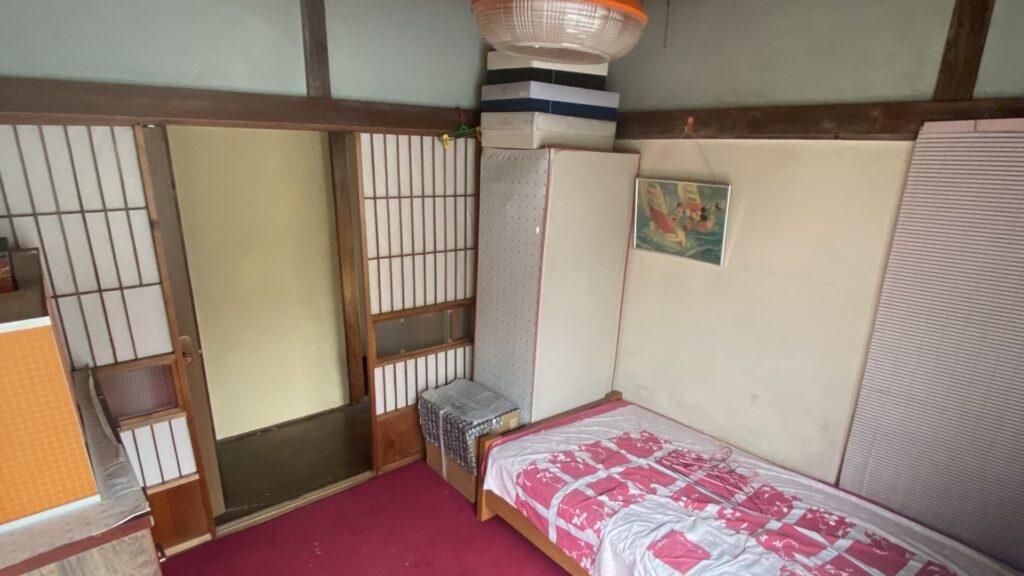Japan’s akiya, or abandoned house, turned into luxury Airbnb

Anton Wormann, 32, moved to Japan in October 2018.
Courtesy of Anton Wormann
Anton Wormann, 32, has always had a passion for DIY projects and creating beautiful spaces. So, after he discovered that his neighbor’s property had been abandoned, he decided to purchase it and bring it back to life.
Upon inspection, Wormann discovered that the property had been vacant for about 10 years after its elderly owners passed away.
This property was one of the 9 million “akiyas” — empty houses — across Japan, according to official government data as of 2023.
While many countries face a housing shortage, Japan is seeing something starkly different — an oversupply problem.
From its bustling cities to its beautiful and lush countryside, these abandoned properties are scattered across Japan, and here’s the kicker — they are going for as low as $10,000 a pop.
Japan’s abandoned houses
Japan’s unprecedented demographic crisis has led to millions of empty houses. The country’s population continues to fall as its fertility rate sinks to a record low of 1.2 births per woman as of 2023.
Meanwhile, Japan’s elderly population is growing rapidly with people aged 65 and over estimated to account for about 30% of the country’s total population, according to 2024 data.
Death rates have surpassed birth rates in Japan, contributing to abandoned properties. Some people, like Wormann, have identified this trend as an opportunity to buy real estate for cheap, and try to save some beautiful Japanese architecture from being lost.
An ‘akiya’ discovery
Wormann, who grew up in Sweden and has lived in major cities such as Paris, London, Milan and New York for almost a decade, fell in love with Japan when he visited it in 2015 for a work trip.
Following that visit, Wormann made it a point to go back to the Asian country every year. “Every time I was about to leave, I just never felt that I was ready to leave,” he said. He was in awe of the beautiful scenery, delicious food, and the culture in general.
“I really wanted to stay here and spend more time here. I really can’t put words to it, but it just vibrated with me.” So, in October 2018, he took the leap of faith and moved to Japan.
Once he became more acquainted with the Japanese culture and language, Wormann discovered a big opportunity in purchasing “akiyas,” renovating them, and turning them into beautiful short-term rental properties.
“I kind of read some articles about it … and it fascinated me, but I never really understood how big of a problem, and also for me, how big of an opportunity it was until I actually moved here, learned Japanese and got integrated into society,” he said.
Wormann as a kid would explore ideas with his father on renovating old houses they came across, and was always interested in such projects. Before discovering his neighbor’s house, he already had experience renovating multiple properties in Sweden and Japan.
“Making something beautiful takes time … and it becomes something that no one else can replicate,” he said. “Like to create something really, really good that you’re very proud of — it just makes me very happy.”
The renovation process
After discovering the empty property next door, Wormann was able to get in contact with the owner’s children with the help of a neighbor.
Wormann bought the 86-year-old property for about 8 million yen (about $54,000), excluding closing costs and fees, according to documents reviewed by CNBC Make It.
Before starting the demolition process, Wormann had to clear the property of old belongings.
Courtesy of Anton Wormann.
The property still had belongings of its previous residents, a common occurrence among abandoned properties in Japan. The house was infested with termites and needed major structural upgrades.
“I was definitely intimidated … and I’ve only seen it from outside, so I could have only imagined what it looked like from the inside,” he said. “I expected it to be clean, empty [and] pretty tiny, but that wasn’t the case.”
“There were a lot of uncertainties, but I loved the location, I loved the sunlight, I loved the size, and there’s nothing you can’t really fix if you have these things in place,” he said.
It took Wormann 15 months to renovate the property.
Anton Wormann spent over 1,000 hours working on renovating a $55,000 akiya property in Tokyo.
Courtesy of Anton Wormann.
“Renovating in Tokyo, the pieces of land are so narrow, so like you have to demolish one piece and then throw away as you go, because if not, the renovation won’t move forward,” he said.
“So demolish, rent a car, take it to the dump, get back,” and it was this rinse and repeat that needed to keep happening throughout the entire months-long process.
Renovating the abandoned property took 15 months to complete.
Courtesy of Anton Wormann.
The design choices for the home “came over time,” he said. “You feel where and how you want things to be done. You feel the sunlight. You feel the space … What can you save from the original details?”
“All these small choices [came] from spending 1000s of hours in that house,” he said.
Wormann spent a total of about 1,500 hours working on the house over the span of about a year. “It occupied my mind. I lived for that house for a year,” he said, and in total, he says he spent another 8 million yen (about $54,000) on the renovation.
In total, it cost about $110,000 to purchase and renovate the property. It has now become a popular among tourists visiting Tokyo and goes for about $500 a night on Airbnb. Each month, it brings in about $11,000 in rental revenue, according to documents reviewed by CNBC Make It.
Design choices for Wormann’s Tokyo akiya came over the course of months working on the property.
Courtesy of Anton Wormann.
Passion project turned business
What started for Wormann as a passion project is now turning into a viable business. The 32-year-old now owns eight properties in Japan, seven of which were once abandoned houses. He has completed renovations on three of the properties and is currently working on renovating four more.
Inside the finished dining room of Anton Wormann’s akiya property.
Courtesy of Anton Wormann
With lots of love and effort, these abandoned homes which may be seen as “old” and dilapidated by some, can be revived and turned into something beautiful once again, Wormann said.
“There are dying villages [in Japan] … I think, from a cultural perspective, there are a lot of beautiful houses that are going to waste.”
“There are a lot of things that used to thrive, maybe 30, 35, 40 years ago, that are now being abandoned and being forgotten and it’s, it’s fascinating, but it’s also kind of sad,” he said. “But you can save them, you can salvage them,” he said.
Want to master your money this fall? Sign up for CNBC’s new online course. We’ll teach you practical strategies to hack your budget, reduce your debt, and grow your wealth. Start today to feel more confident and successful. Use code EARLYBIRD for an introductory discount of 30% off, now extended through September 30, 2024, for the back-to-school season.
Plus, sign up for CNBC Make It’s newsletter to get tips and tricks for success at work, with money and in life.

#Japans #akiya #abandoned #house #turned #luxury #Airbnb
News plays a pivotal role in our lives by keeping us informed and connected to the world. It serves as a critical source of information, offering updates on current events, politics, economics, science, and more. Through news, we gain awareness of global issues and local developments, helping us make informed decisions in our personal and professional lives. News also fosters discussion and debate, encouraging critical thinking and perspective-taking. Moreover, it promotes transparency and accountability among governments, businesses, and other institutions. In a rapidly changing world, staying updated with the news enables us to adapt to new challenges and opportunities, shaping our understanding of the complexities of society. Ultimately, news is not just about information; it empowers us to participate actively in the world around us, contributing to a more informed, engaged, and responsible global citizenry.
Health is fundamental to our well-being and quality of life, making it an essential aspect of daily existence. It encompasses physical, mental, and emotional aspects, influencing our ability to function effectively and enjoy life fully. Prioritizing health allows individuals to maintain optimal physical fitness, reducing the risk of diseases and promoting longevity. Mental health, equally crucial, affects our cognitive abilities, emotional stability, and overall happiness. Investing in preventive healthcare through exercise, balanced nutrition, and regular medical check-ups helps in early detection of potential health issues, ensuring timely intervention and treatment. Beyond individual benefits, a population’s health impacts societal productivity and economic stability. Governments and organizations worldwide emphasize public health initiatives to address pandemics, health disparities, and promote overall well-being. Ultimately, health serves as the foundation upon which we build our lives, influencing our ability to pursue goals, nurture relationships, and contribute meaningfully to society.
Money plays a crucial role in our lives as a means of financial security and freedom. It enables us to meet basic needs such as food, shelter, and healthcare, while also providing opportunities for education, travel, and personal growth. Beyond material comforts, money facilitates social connections and experiences that enrich our lives. It empowers individuals to invest in their futures, whether through savings, investments, or entrepreneurial ventures, thereby fostering economic stability and growth. However, the pursuit of wealth should also be balanced with ethical considerations, as money can influence relationships and societal dynamics. Responsible management of finances is key to achieving long-term goals and mitigating financial stress. Ultimately, while money is a tool for achieving aspirations and fulfilling desires, its true value lies in how it is utilized to improve both personal well-being and the broader community.
Earning Easy Money in 2024: Opportunities and Considerations 💸
In 2024, the landscape of earning easy money presents diverse opportunities, albeit with considerations. The digital age offers platforms for freelancing, online trading, and e-commerce, allowing individuals to leverage skills and creativity for financial gain. Cryptocurrency investments continue to allure with potential for quick profits, yet they entail high volatility and risk. Moreover, the rise of the gig economy enables flexible work arrangements through apps and websites, offering quick payouts but often without job security or benefits. Passive income streams such as rental properties and investments in stocks or bonds remain viable, but demand initial capital and ongoing management. Amid these options, caution is essential to avoid scams and unsustainable ventures promising overnight success. Ultimately, while the allure of easy money persists, informed decisions, diligence, and a long-term perspective are crucial for sustainable financial growth and security in the dynamic year ahead.





